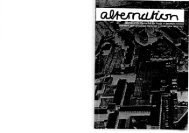Re-reading The Purloined Letter - Alternation Journal
Re-reading The Purloined Letter - Alternation Journal
Re-reading The Purloined Letter - Alternation Journal
You also want an ePaper? Increase the reach of your titles
YUMPU automatically turns print PDFs into web optimized ePapers that Google loves.
397<br />
<strong>Re</strong>-<strong>reading</strong> <strong>The</strong> <strong>Purloined</strong> <strong>Letter</strong><br />
defines ‘hero’ as the subject like Oedipus, who accepts the consequences of<br />
his act. <strong>The</strong> reverse of the subject’s message is its repressed, thus, we can<br />
see the idea of the impossibility of metalanguage is linked to the return of<br />
the repressed. Žižek (1992:14) asks the question: What could the Derridean<br />
notion that a letter can also miss its destination mean? He responds:<br />
That the repressed can also not return and yet by claiming this, we<br />
entangle ourselves in a naïve substantialist notion of the unconscious<br />
as a positive entity ontologically preceding its ‘returns’ that is;<br />
symptoms qua compromise formation, a notion competently called<br />
in question by Derrida himself. Here, we cannot but repeat after<br />
Lacan: there is no repression previous to the return of the repressed:<br />
the repressed content does not precede its return in symptoms, there<br />
is no way to conceal it in its purity undistorted by ‘compromises’<br />
that characterize the formation of the symptoms.<br />
‘A letter always arrives at its destination’ implies that one can never<br />
escape one’s fate and Žižek (1992:16) defines this in psychoanalytic terms as<br />
‘the symbolic debt has to be paid’. <strong>The</strong> letter which arrives at its destination<br />
is also a letter of request for outstanding debts; what propels the letter on its<br />
symbolic circuit is always some outstanding debt. Žižek (1992:16) declares<br />
that this dimension of fate is at work in the very formal structure of Poe’s<br />
<strong>The</strong> <strong>Purloined</strong> <strong>Letter</strong>: there is something distinctly ‘faithful’ in the way the<br />
self-experience of the main characters in Poe’s story is determined by the<br />
simple ‘mechanical’ shift of their positions within the intersubjective triad of<br />
the three glances (the first which sees nothing; the second which sees that<br />
the first sees nothing and deludes itself as to the secrecy of what it hides; the<br />
third which sees that the first two glances leave what should be hidden<br />
exposed to whomever would seize it). In the way, for example, the<br />
Minister’s fate is sealed not because of his personal miscalculation or<br />
oversight but because the simple shift of his position from the third to the<br />
second glance in the repetition of the initial triad causes his structural<br />
blindness. Žižek (1992:16) sees this as the mechanism of imaginary (mis)<br />
recognition: the participants in the play automatically perceive their fate as<br />
something that pertains to the letter as such in its immediate materiality (this<br />
letter is damned, whoever comes into possession of it is brought to ruin!)—

















